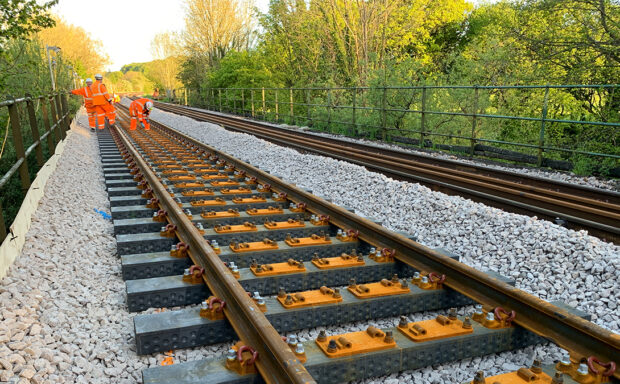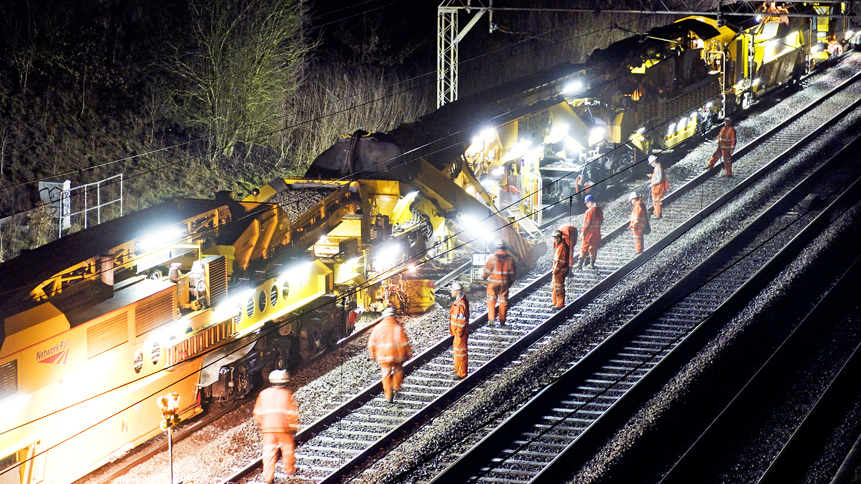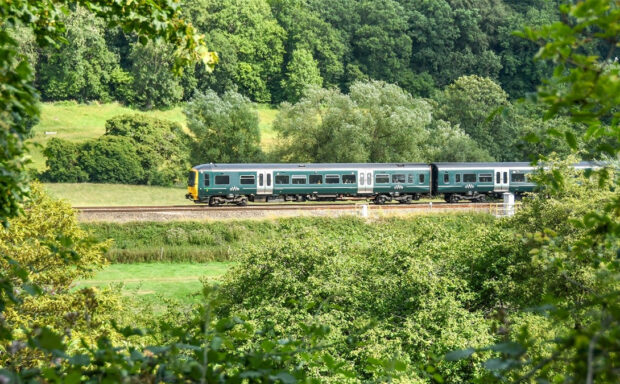The railway is working hard to keep vital goods moving and train services running for essential workers.
Like in all sectors, the coronavirus outbreak has put great pressure on the railway but colleagues everywhere have worked tirelessly to keep vital services moving. It means key workers can continue their essential journeys and urgently needed goods can get from ports to the supermarket shelves and to the National Health Service.
On April 3, we celebrated Railway Day – a time for the rail industry to come together and say a huge thank you to everybody who has supported the railway in recent weeks.
Across the railway, we – and train operators – have shown appreciation for the NHS by clapping for carers each Thursday at 8pm and lighting railway infrastructure including the Glenfinnan Viaduct blue.
Here’s a look at how we have responded to the coronavirus outbreak so far:
King’s Cross station team keeps critical workers moving
Our station team at London King’s Cross has adopted new ways of working to ensure those who need to travel can reach their destinations safely.
Caroline Hynds is a shift station manager at King’s Cross, where about 150,000 people usually come through the doors each day. Footfall has fallen by about 92% at the station since the Government introduced restrictions to combat coronavirus.
Along with her team, Caroline is helping to maintain social distancing for passengers and staff. Measures include staff to help keep passengers moving, as well as floor stickers so people can make sure they are at least two metres apart from others.
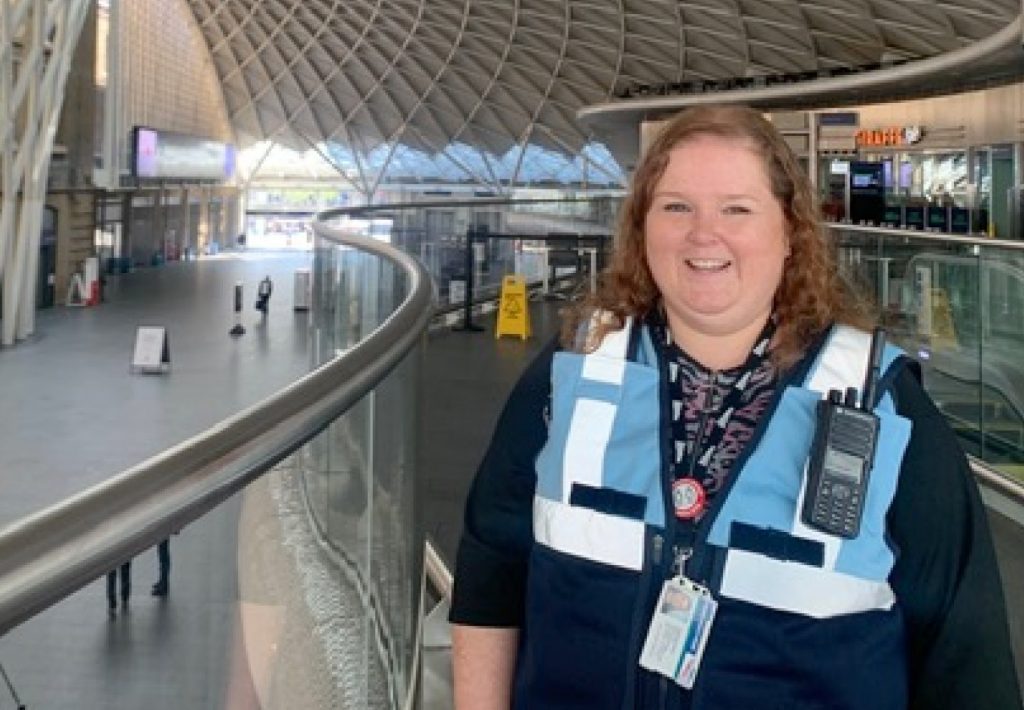
Joint effort to keep 450,000 homes powered up across UK
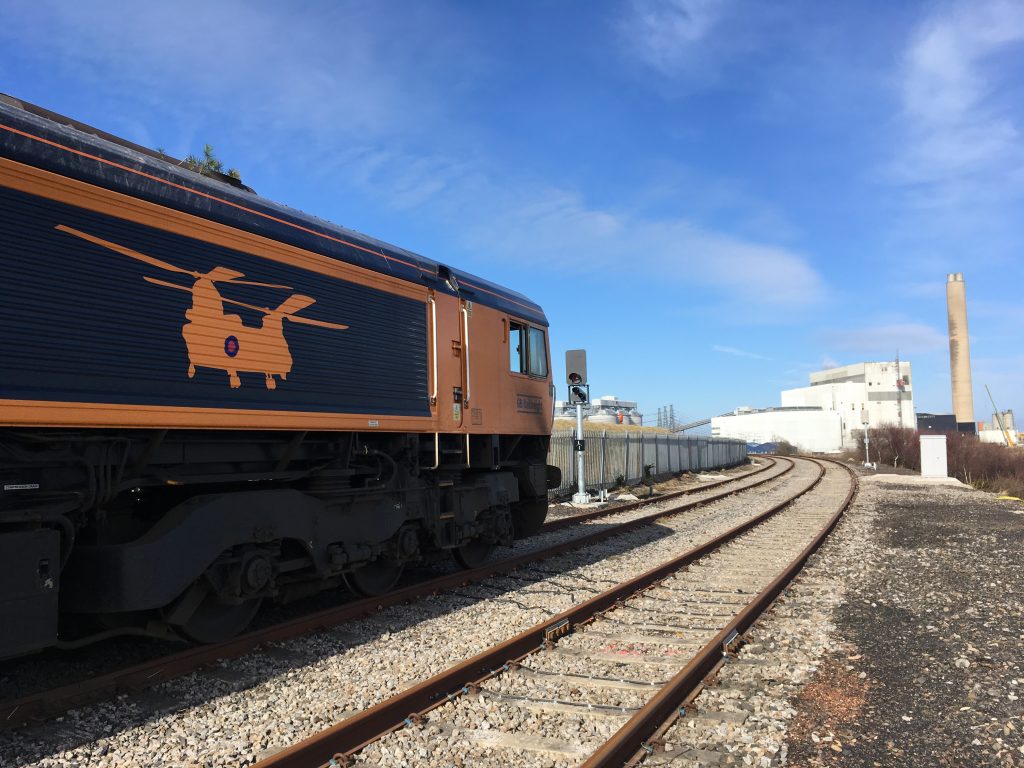
Network Rail, renewable energy project Lynemouth Power, deep sea port Port of Tyne and GB Railfreight are working together to keep the lights on at 450,000 homes across the United Kingdom.
The railway and its critical workers are keeping vital freight services moving during the pandemic. Freight services keep supermarket shelves stocked and key medical equipment moving, as well as transporting biomass to generate energy and keep the nation powered up.
Every week, over 30,000 tonnes of sustainably-sourced wood pellets are transported from the Port of Tyne to Lynemouth Power Station via the railway. The biomass travels a short way up the East Coast Main Line from Newcastle, before using the Ashington, Blyth and Tyne lines and heading onto the facility.
The railway is absolutely vital in getting the biomass to where it needs to be, as freight services are Lynemouth Power’s primary means of bulk supply. Network Rail is working round the clock to make sure that the railway can continue running reliably on this heavily used route, on which two GBRF sets, each carrying about 1700 tonnes, run six to seven days a week whenever necessary.
Kevin Newman, senior freight manager at Network Rail, said: “The railway continues to play a key role during the Covid-19 crisis by keeping vital freight services moving, including deliveries of biomass enabling power to be generated for homes and businesses across the country.”
Network Rail workers in North East donate PPE
Network Rail workers in the North East of England are supporting the NHS by donating spare personal protective equipment (PPE) to staff at Hexham General Hospital in Northumberland.
Members of Network Rail’s operations team in Newcastle have an important role to play in keeping the railway operating safely and efficiently, so people who cannot work from home, such as doctors and nurses, can use the railway to get to their jobs. It is also essential that food, medical supplies and fuel can continue to be transported across the country via freight services.
Local operations manager Chris Thomas, operations manager Mick Hodgson, mobile operations manager Craig Jackson and signaller Jamie Seaton wanted to help NHS staff in the area. Jamie approached his colleagues as his wife, Laura Seaton, works as a nurse practitioner at Hexham General Hospital.
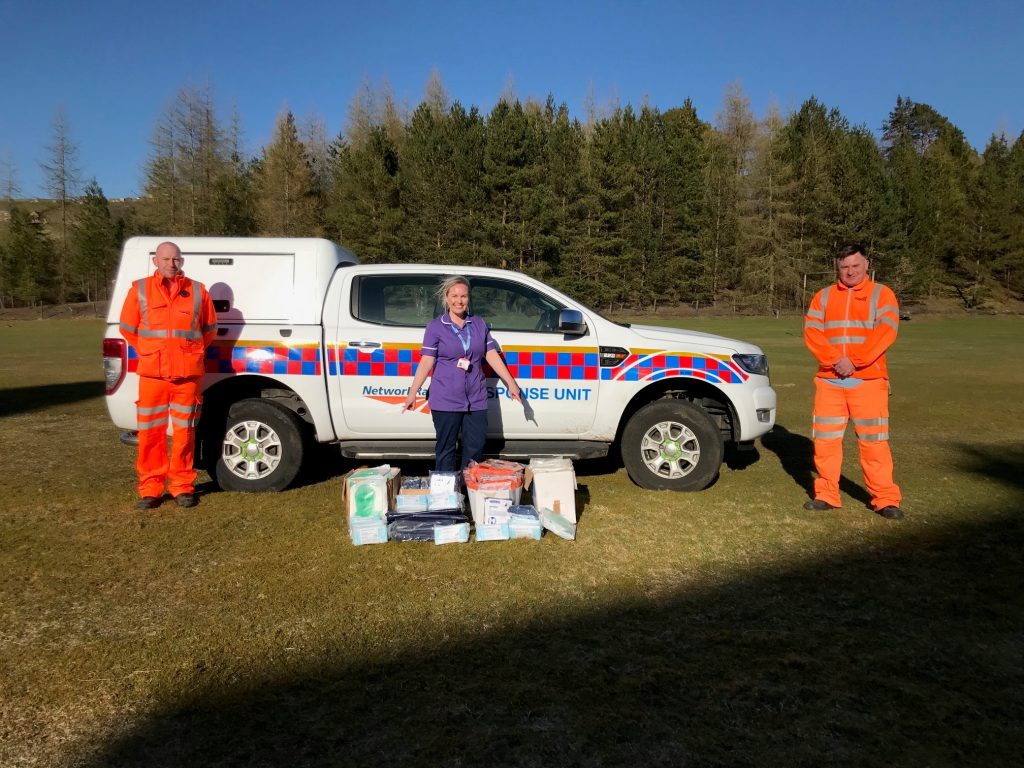
The team worked together to supply spare PPE – 44 pairs of high-quality safety glasses and 60 bodysuits for Hexham General Hospital.
Freight route from Spain launched
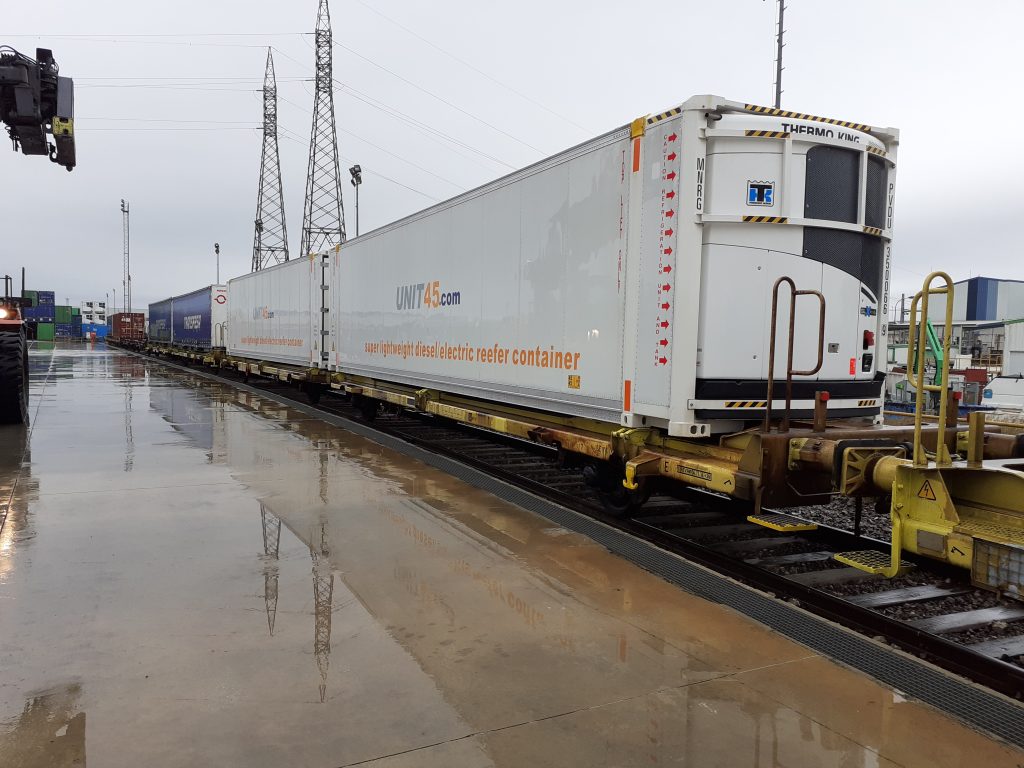
We’re working hard to keep supermarkets supplied with food by working with suppliers on two new food routes from Valencia and Murcia into London.
DB Cargo UK and Transfesa Logistics have successfully launched an express 72-hour rail service to transport essential hygiene, medical and food products from terminals in Valencia and Murcia to London.
This type of traffic is carried in refrigerated containers and expands the activity that Transfesa Logistics had so far operated on a national and international scale. The objective is to develop these railway operations with a daily train to keep supermarkets shelves stocked.
The new services operate into DB Cargo UK’s Barking Intermodal Terminal in London which is strategically connected to the High Speed 1 (HS1) rail link. Rail freight is one of the most sustainable modes of transport, emitting less CO2 with each of these rail services removing 30 HGVs from the road network.
Thousands of tonnes of goods will be transported by freight to support the economy and keep supermarkets stocked up with vital supplies.
Volunteers from Network Rail help deliver Nightingale hospital
Network Rail has provided its logistics and project management expertise to help deliver the NHS Nightingale Hospital North West in Manchester.
Dozens of volunteers with specialisms in supply chain and logistics worked with the Army Reserve and National Health Service to get the hospital, which has capacity for up to 750 patients, open over the Easter weekend.
The volunteers helped unload, move and build hospital beds, ready for the arrival of the first coronavirus patients on Easter Sunday.
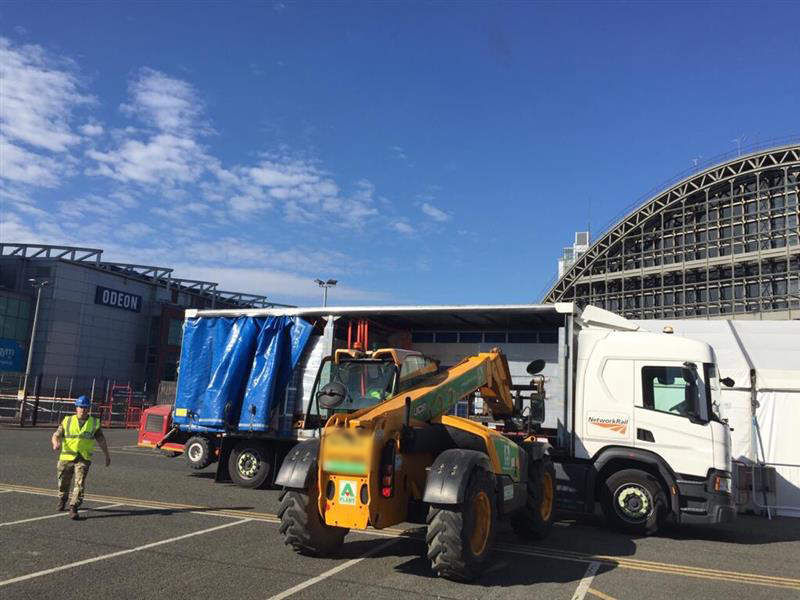
Temporary training centre for signallers opens in just four weeks
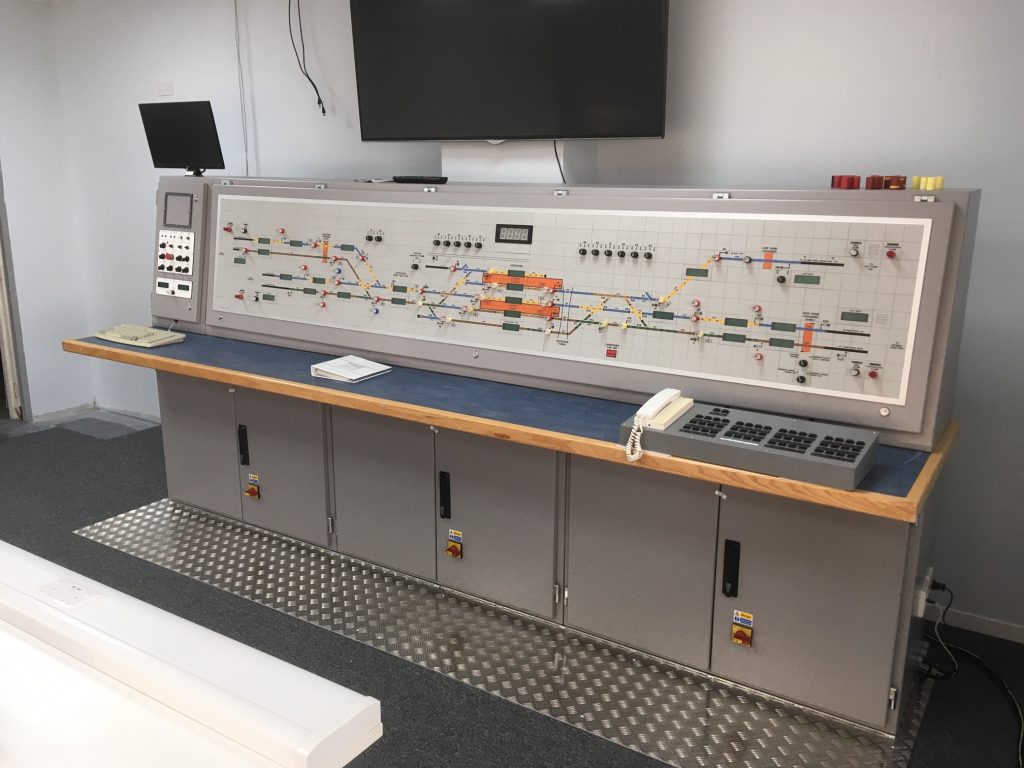
We opened a temporary facility for training signallers in under a month so we could continue signalling training for new recruits locally and ensure we build our resilience with a contingent workforce in the wake of coronavirus.
The Crindau depot in Newport, South Wales, was chosen as the temporary location before the outbreak of COVID-19 and will be used to deliver contingency training following the recent appeal for retired signallers to help keep Britain moving during the pandemic.
Signallers play an essential role in keeping trains moving but require specialist training to allow them to do the job safely and efficiently.
We recently appealed for retired signallers, or those who have moved to other careers in the railway industry, to volunteer to provide cover at signal boxes and control centres if some current signallers fall ill or need to self-isolate during the covid-19 outbreak. More than 200 signallers across Wales and the West of England responded to the call to arms.
The new signalling training centre in Newport will now be used to train new recruits as well as those returning to signalling on the national railway.
Click here to find out more about returning to work during coronavirus if you’re a former signaller.
Meanwhile, we’re training extra signallers with the help of a heritage centre. Swindon Panel Society, based at Didcot Railway Centre, offered use of its reconstructed and refurbished signalling panel – the desk signallers use to control trains, to help ensure we enough trained signallers available.
We would ordinarily train signallers in existing control rooms but to those areas are not available as we try to minimise the risk of spreading the virus.
The society’s equipment works in the same way in terms of route-setting – simulated trains move around the layout, obeying signals and braking and accelerating in a realistic way, making the panel an ideal training tool.
Thanking passengers for staying at home
We thanked passengers for heeding government advice to stay home – footfall at railway stations has fallen by about 90% at some of our busiest railway stations in recent weeks.
Figures published by Network Rail show that across the stations managed by our Southern region, footfall has dropped by about 93% on weekdays and 96% during weekends.
London Waterloo has had the biggest decrease in the region with a 95% reduction compared with the 94.2m annual journeys, or about 125,000 journeys made through the station on an average weekday.
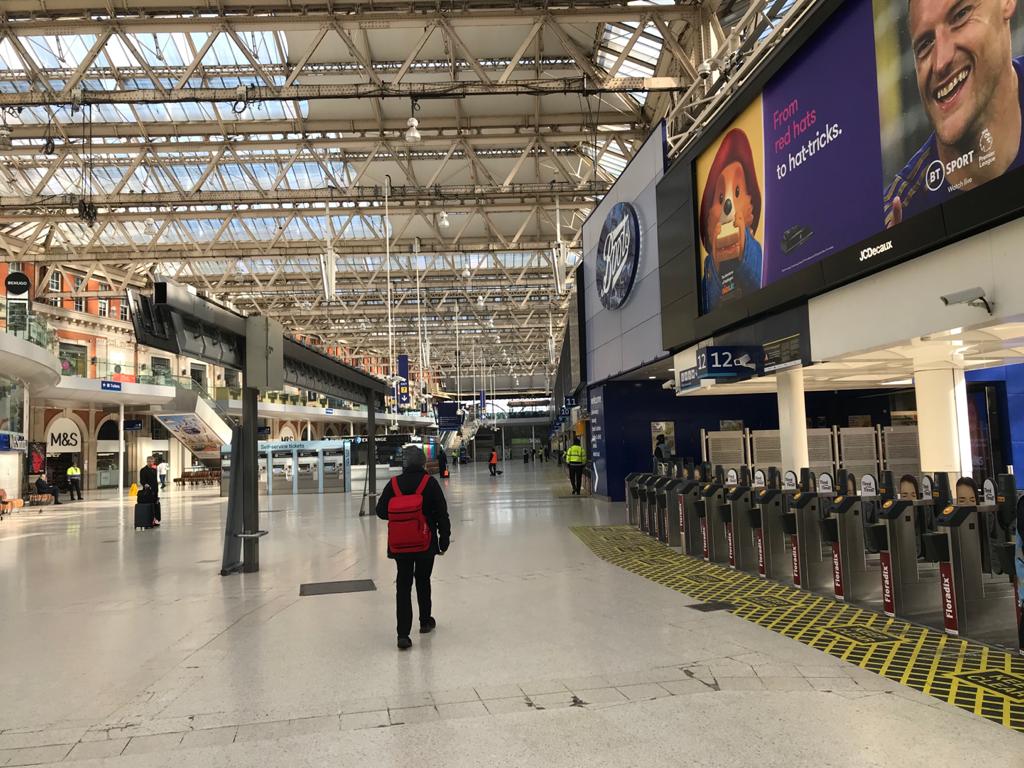
At London King’s Cross, it’s fallen by 92% during March 25 to March 31 inclusive compared with March 1 and March 7. It’s a similar picture elsewhere in Britain. At Leeds station, footfall decreased by 94% in the same period.
We are urging anyone who is making non-essential journeys to stop doing so immediately.
Passengers who cannot work from home and do need to use the railway should continue to check before travelling by visiting www.nationalrail.co.uk or checking with their train operator.
Food bank collection point created at Manchester Piccadilly station
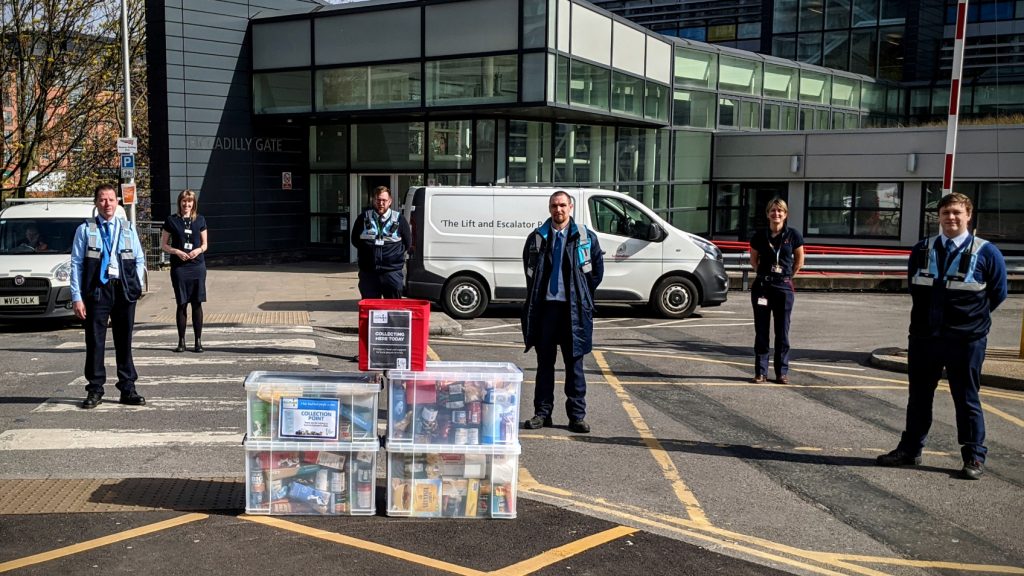
Manchester Piccadilly station has opened a collection point for food bank donations during the coronavirus pandemic.
The station team had the idea after food from the staff canteen at Network Rail’s nearby Square One offices risked going to waste after the coronavirus lock down came into effect.
With thousands of Network Rail employees usually based at the site on Travis Street now working from home, it left the well-stocked cafeteria with plenty of food and no mouths to feed.
To help, the food bank donation point has been set up in the station so Network Rail staff and passengers completing essential journeys can give food to a worthy cause.
The collection will be delivered to the food bank each Wednesday.
Meanwhile, the railway teamed up with the fire brigade to carry out a huge Easter egg give away for children in Cumbria.
Local operations manager Chris Williamson has been delivering food parcels and donated ready meals to vulnerable and isolated members in the Copeland area during the coronavirus crisis.
During the Easter bank holiday weekend, Morrisons supermarket donated 1,000 Easter eggs to the Cleator Moor Covid Support Group to give to children stuck inside over the Easter weekend. Working with the Copeland Community Resilience Group, Chris called on the fire brigade to help collect and distribute the hundreds of eggs, bringing smiles to faces across his local area.
Freight rises to the challenge
The rail freight industry is working together to keep essential supplies moving on the West Coast Main Line – the busiest mix-use (passenger and freight) railway in Europe.
Network Rail and freight operating companies are responding to rising demand for goods like food, fuel and medicine during the coronavirus (covid-19) pandemic.
Britain’s lockdown has underscored the importance of freight. The number of passenger services has fallen sharply in recent weeks as we have urged people to stay safe at home and prioritised freight trains. At the same time, customer demand for critical supplies like store cupboard items and toiletries has surged.
We have worked with the rail freight industry all over Britain to keep all our freight services running.
It’s helped the economy, the National Health Service, petrol at the pumps and food in shops.
We have have kept the railway open throughout the coronavirus outbreak and have put steps in place to ensure key workers can get to their critical jobs and to move thousands of tonnes of vital supplies by freight.
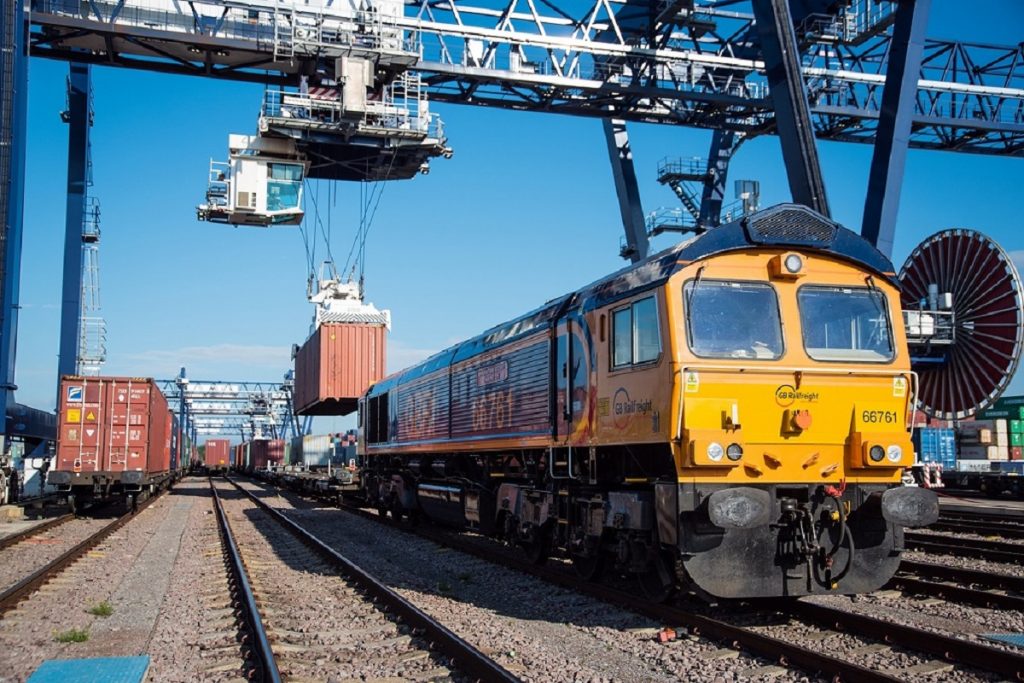
We introduced a reduced passenger timetable so a reliable service would be in operation to get key workers, such as NHS staff, to work while allowing more freight trains to run to meet demand.
It has been possible to do this thanks to dedication of Network Rail teams who have continued to work as they are listed as key workers by the Government and the help of passengers who have taken advice of only to travel when it is essential.
Read about freight is also helping keep lights on in homes and at businesses with vital biomass deliveries to Drax power station in Yorkshire.
Reminder: the government has advised people against non-essential travel. If your journey is essential and you need to go by train, please check before you set out. You should also follow public health advice: if you need to cough or sneeze, please ‘catch it, bin it, kill it’.
Free parking for key workers
On April 1, we announced free parking for key workers at 24 locations across Britain. By downloading the APCOA Connect App and following a set of simple instructions, key workers from nurses and carers, to transport workers and supermarket employees, were able to park for free at locations across the country, including at London Paddington, Birmingham New Street and York.
As lockdown restrictions are easing and rail services increase, normal parking charges will now apply. These changes come into place from midnight, Monday 18 May 2020 and therefore our free parking offer will no longer apply. Thank you for your understanding as we increase rail services.
Cash flow boost for our suppliers
We’re giving thousands of British companies a vital boost to their cash flow during the coronavirus crisis.
We will pay our suppliers immediately. This means payment could be up to seven days quicker for small to medium-sized businesses (SMEs) and up to 28 days faster for other suppliers.
From Monday 30 March, Network Rail has committed to pay its suppliers immediately, or as close to immediately as possible, following approval of the payment ledger, with the expectation that subsequent payments flow down the supply chain.
Reduced timetable turned around in just one week
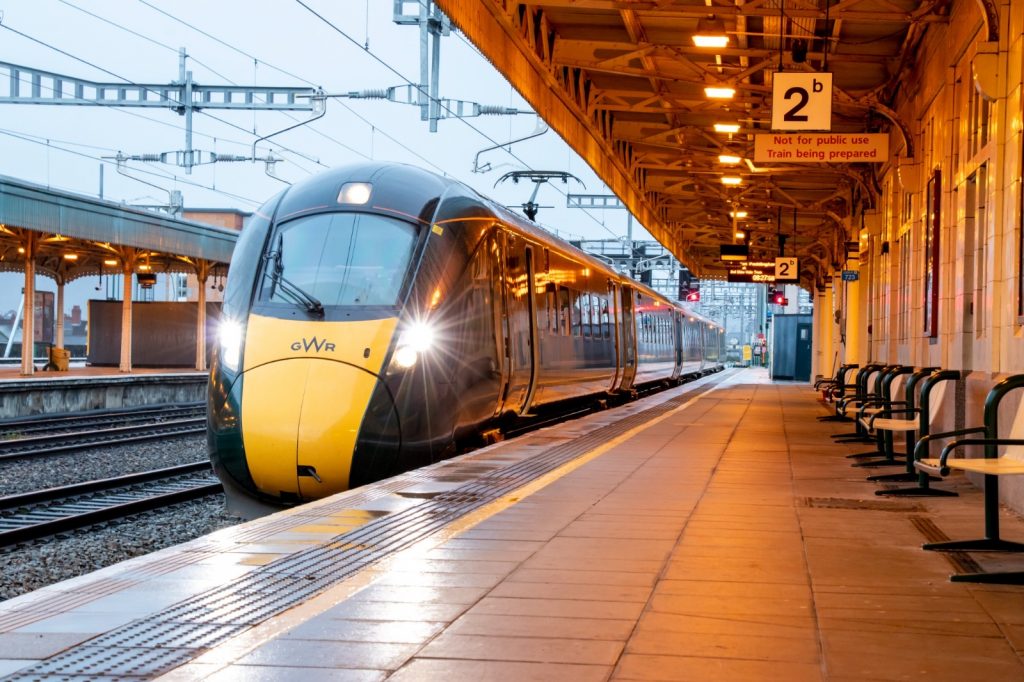
We introduced a new a reduced timetable to ensure vital train services for key workers could keep running through a prolonged coronavirus outbreak.
It would usually take about 14 weeks to process a major timetable change such as this but our Capacity Planning team completed the challenge in just one week.
The team initially held a conference call with all Train Operating Companies (TOCs) to set the scene and talk them through Capacity Planning’s business continuity plan. Calls then took place with TOCs and our routes and regions separately to understand each area’s needs.
Similar to a puzzle, the team had to rearrange the timetable’s structure by almost halving services – ensuring no trains were planned through possessions (when Network Rail has access to a line for maintenance). We also checked significant junctions for conflicts.
Matt Allen, head of timetable production, said: “One of the key challenges faced was bringing together passenger and freight timetables – aligning passenger to the weekend style structure whilst keeping the normal weekday timetable for freight.”
Helping deliver medical face masks
Railway workers drove hundreds of miles through the night to deliver two lorry loads of protective medical face masks for frontline workers in the NHS.
Network Rail lent its staff and vehicles for the special delivery from Merseyside to army barracks in Hampshire on the night of Monday 23 March.
The 230-mile journey was part of an army logistics operation to provide protective equipment to hospitals during the Covid-19 pandemic.

The railway vehicles carried 22 pallets of face masks from a storage warehouse in St Helen’s to 101 Logistic Brigade at St Omer Barracks Aldershot, ready to be distributed to medical staff treating patients with coronavirus.
Rent relief for retailers

On March 20, we announced swift and significant measures aimed at supporting retailers in Britain’s busiest and biggest stations, and small business tenants across their commercial estate.
It came as the coronavirus pandemic began to severely impact trading.
With immediate effect, we cancelled all first quarter (25 March to 23 June 2020) rent payments due from tenants in our commercial estate portfolio, providing significant relief for small businesses who are worried about the impact of the virus on their footfall.
Further, we cancelled all base rent payments for retailers in our managed stations for the first quarter of the new financial year (April to June 2020)*. Removing base rent payments for an entire quarter will help retailers during this tough time. Read more here.
Calling all former signallers
We appealed for former signallers to keep vital train services moving. Have you signalled trains professionally? We need your help during the coronavirus outbreak to provide crucial support to keep the railway running.
We’re working hard to keep signal boxes and control centres across Britain open 24/7. This allows key workers such as doctors and nurses to continue travelling to work and means vital food and medical supplies can be transported across the country via freight services.

Signallers make sure the railway operates safely and allow trains to run. We’re appealing for retired signallers, or those who have moved to other careers in the railway industry, for roles at signal boxes across the country.
The railway is currently performing well but it is important to prepare for the next few weeks. Former signallers can provide crucial cover if some members of the workforce need to self-isolate.
Empty shop becomes a clinic
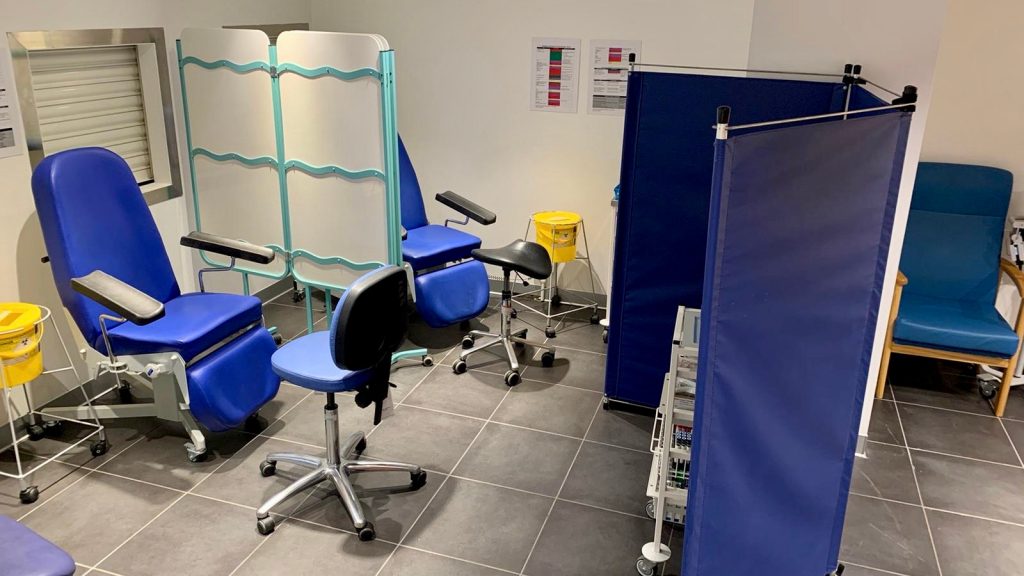
An empty shop at Birmingham New Street station became an NHS clinic for patients to have routine blood tests away from hospital.
We’re providing the former retail space for free to medics for six months to alleviate pressure on Midlands hospitals as they deal with the coronavirus pandemic.
The temporary phlebotomy clinic will be staffed by the University Hospitals Birmingham trust and tests will be carried out by appointment only.
Moving some outpatient services like routine blood tests out of hospitals will protect healthy people from encountering patients sick with coronavirus.
Trespass warning
‘Holidays’ always lead to a spike in railway trespass, often with horrendous consequences for children and their families.
More than 13,500 trespass incidents occur on the rail network each year, a quarter of which involved young people.
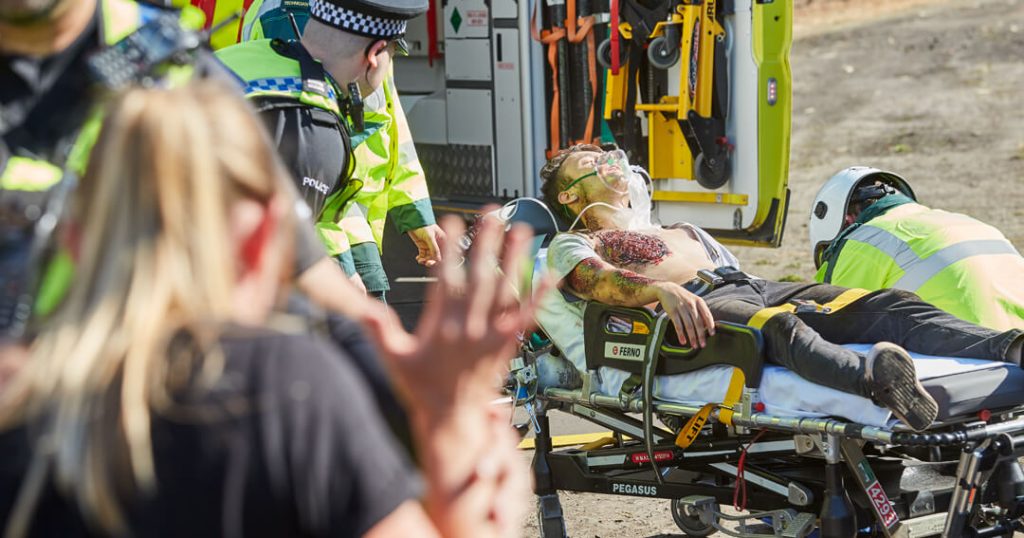
Allan Spence, head of public and passenger safety at Network Rail, said: “Easter holidays and the clocks going forward are the start of the peak for railway trespass and with schools now closed for an extended period, I’m really worried that the railway will become an irresistible but catastrophic playground for young people.

